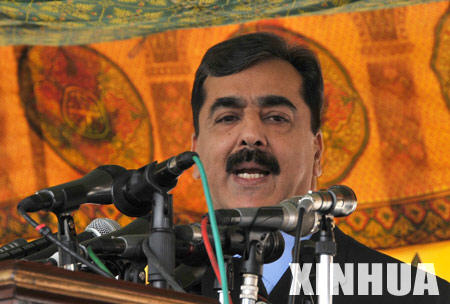Pakistan's former National Assembly speaker Yousuf Raza Gillani was elected as the new Prime Minister of the country on Monday.
Gillani secured 264 votes from the 342-seat parliament, and Pervaiz Elahi, the candidate from opposition party Pakistan Muslim League-Quaid (PML-Q), got 42 votes.

Yousaf Raza Gilani, the candidate for prime minister nominated by the Pakistan People's Party (PPP), talks to the press outside the Parliament building before the election in Islamabad, Pakistan, March 24, 2008. Gillani, the PPP vice-chairman, secured 264 votes from the 342-seat lower house of parliament in Monday's elections. (Xinhua Photo)
The Prime Minister will be sworn in before President Pervez Musharraf on Tuesday and the government is expected to be sworn in later in the week.
"We have paid heavy prices for restoration of democracy," Gillani said in his first address as Prime minister.
"Bhutto's sacrifice has enabled the restoration of democracy," said Gillani in Pakistan's national language urdu.
Gillani said the government would protect all the institutions including judiciary, asking the immediate release of detained judges.
Gillani, from the central province of Punjab, was the Speaker of the National Assembly during the second government of former Prime Minister Benazir Bhutto, who was assassinated last December in a suicide attack.
Gillani was arrested in 2001 and spent four years in jail, charged with abusing authority as speaker.
Gillani is currently the vice president of the Pakistan People's Party (PPP). Local media said the low-key Gillani is a loyalist to Bhutto family and the PPP.
The PPP emerged as the largest party in the National Assembly in the general elections held on February 18.
The TV footage showed Bhutto's 19-year-old son Bilawal Bhutto Zardari shed tears when the National Parliament speaker Fahmida Mirza announced the election results.
Bilawal was appointed the chairman of Bhutto's PPP party after Bhutto was assassinated.
The PPP is now led by Bhutto's widower, Asif Ali Zardari, but Zardari is ineligible to compete for the post of Prime Minister because he is not elected to the parliament.
(Xinhua News Agency March 25, 2008)